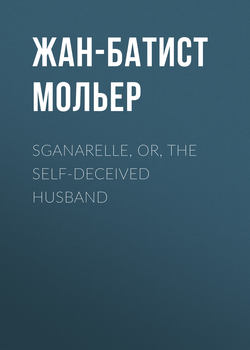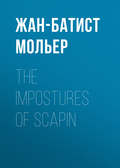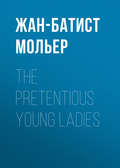
000
ОтложитьЧитал
SCENE XI. – LELIO, SGANARELLE'S WIFE
SGAN.'S WIFE. In spite of me, my wretch… (Seeing Lelio). Good lack! what ails you? I perceive, sir, you are ready to faint away.
LEL. It is an illness that has attacked me quite suddenly.
SGAN'S WIFE. I am afraid you shall faint; step in here, and stay until you are better.
LEL. For a moment or two I will accept of your kindness.
SCENE XII. – SGANARELLE, A RELATIVE OF SGANARELLE'S WIFE
REL. I commend a husband's anxiety in such a case, but you take fright a little too hastily. All that you have told me against her, kinsman, does not prove her guilty. It is a delicate subject, and no one should ever be accused of such a crime unless it can be fully proved.
SGAN. That is to say, unless you see it.
REL. Too much haste leads us to commit mistakes. Who can tell how this picture came into her hands, and, after all, whether she knows the man? Seek a little more information, and if it proves to be as you suspect, I shall be one of the first to punish her offence.
SCENE XIII. – SGANARELLE, alone
Nothing could be said fairer; it is really the best way to proceed cautiously. Perhaps I have dreamt of horns without any cause, and the perspiration has covered my brow rather prematurely. My dishonour is not at all proved by that portrait which frightened me so much. Let me endeavour then by care…
SCENE XIV. – SGANARELLE, SGANARELLE'S WIFE, standing at the door of her house, with LELIO
SGAN. (Aside seeing them). Ha! what do I see? Zounds! there can be no more question about the portrait, for upon my word here stands the very man, in propria persona.
SGAN.'S WIFE. You hurry away too fast, sir; if you leave us so quickly, you may perhaps have a return of your illness.
LEL. No, no, I thank you heartily for the kind assistance you have rendered me.
SGAN. (Aside). The deceitful woman is to the last polite to him. (Sganarelle's Wife goes into the house again).
SCENE XV. – SGANARELLE, LELIO
SGAN. He has seen me, let us hear what he can say to me.
LEL. (Aside). Oh! my soul is moved! this sight inspires me with… but I ought to blame this unjust resentment, and only ascribe my sufferings to my merciless fate; yet I cannot help envying the success that has crowned his passion. (Approaching Sganarelle). O too happy mortal in having so beautiful a wife.
SCENE XVI. – SGANARELLE, CELIA, at her window, seeing Lelio go away
SGAN. (Alone). This confession is pretty plain. His extraordinary speech surprises me as much as if horns had grown upon my head. (Looking at the side where Lelio went off). Go your way, you have not acted at all like an honourable man.
CEL. (Aside, entering). Who can that be? Just now I saw Lelio.
Why does he conceal his return from me?
SGAN. (Without seeing Celia). "O too happy mortal in having so beautiful a wife!" Say rather, unhappy mortal in having such a disgraceful spouse through whose guilty passion, it is now but too clear, I have been cuckolded without any feeling of compassion. Yet I allow him to go away after such a discovery, and stand with my arms folded like a regular silly-billy! I ought at least to have knocked his hat off, thrown stones at him, or mud on his cloak; to satisfy my wrath I should rouse the whole neighbourhood, and cry, "Stop, thief of my honour!"
CEL. (To Sganarelle). Pray, sir, how came you to know this gentleman who went away just now and spoke to you?
SGAN. Alas! madam, it is not I who am acquainted with him; it is my wife.
CEL. What emotion thus disturbs your mind?
SGAN. Do not blame me; I have sufficient cause for my sorrow; permit me to breathe plenty of sighs.
CEL. What can be the reason of this uncommon grief?
SGAN. If I am sad it is not for a trifle: I challenge other people not to grieve, if they found themselves in my condition. You see in me the model of unhappy husbands. Poor Sganarelle's honour is taken from him; but the loss of my honour would be small – they deprive me of my reputation also.
CEL. How do they do that?
SGAN. That fop has taken the liberty to cuckold me – saving your presence, madam – and this very day my own eyes have been witness to a private interview between him and my wife.
CEL. What? He who just now…
SGAN. Ay, ay, it is he who brings disgrace upon me; he is in love with my wife, and my wife is in love with him.
CEL. Ah! I find I was right when I thought his returning secretly only concealed some base design; I trembled the minute I saw him, from a sad foreboding of what would happen.
SGAN. You espouse my cause with too much kindness, but everybody is not so charitably disposed; for many, who have already heard of my sufferings, so far from taking my part, only laugh at me.
CEL. Can anything be more base than this vile deed? or can a punishment be discovered such as he deserves? Does he think he is worthy to live, after polluting himself with such treachery? O Heaven! is it possible?
SGAN. It is but too true.
CEL. O traitor, villain, deceitful, faithless wretch!
SGAN. What a kind-hearted creature!
CEL. No, no, hell has not tortures enough to punish you sufficiently for your guilt!
SGAN. How well she talks!
CEL. Thus to abuse both innocence and goodness!
SGAN. (Sighing aloud). Ah!
CEL. A heart which never did the slightest action deserving of being treated with such insult and contempt.
SGAN. That's true.
CEL. Who far from… but it is too much; nor can this heart endure the thought of it without feeling on the rack.
SGAN. My dear lady, do not distress yourself so much; it pierces my very soul to see you grieve so at my misfortune.
CEL. But do not deceive yourself so far as to fancy that I shall sit down and do nothing but lament; no, my heart knows how to act in order to be avenged; nothing can divert me from it; I go to prepare everything.
SCENE XVII. – SGANARELLE, alone
May Heaven keep her for ever out of harm's way! How kind of her to wish to avenge me! Her anger at my dishonour plainly teaches me how to act. Nobody should bear such affronts as these tamely, unless indeed he be a fool. Let us therefore hasten to hunt out this rascal who has insulted me, and let me prove my courage by avenging my dishonour.
[Footnote: A similar adventure is told of the renowned fabulist La Fontaine. One day some one informed him that Poignan, a retired captain of dragoons and one of his friends, was by far too intimate with Madame La Fontaine, and that to avenge his dishonour he ought to fight a duel with him. La Fontaine calls upon Poignan at four o'clock in the morning, tells him to dress, takes him out of town, and then coolly says "that he has been advised to fight a duel with him in order to avenge his wounded honour." Soon La Fontaine's sword flies out of his hand, the friends go to breakfast, and the whole affair is at an end.]
I will teach you, you rogue, to laugh at my expense, and to cuckold people without showing them any respect. (After going three or four steps he comes back again.) But gently, if you please, this man looks as if he were very hot-headed and passionate; he may, perhaps, heaping one insult upon another, ornament my back as well as he has done my brow.
[Footnote: In the original there is a play on words which cannot be rendered in English. Il pourrait bien … charger de bois mon dos comme, il a fait mort front. Bois means "stick" and "stags' antlers."]
I detest, from the bottom of my heart, these fiery tempers, and vastly prefer peaceable people. I do not care to beat for fear of being beaten; a gentle disposition was always my predominant virtue: But my honour tells me that it is absolutely necessary I should avenge such an outrage as this. Let honour say whatever it likes, the deuce take him who listens. Suppose now I should play the hero, and receive for my pains an ugly thrust with a piece of cold steel quite through my stomach; when the news of my death spreads through the whole town, tell me then, my honour, shall you be the better of it.
[Footnote: Compare in Shakespeare's Part First of King Henry IV. v. I, Falstaff's speech about honour.]
The grave is too melancholy an abode, and too unwholesome for people who are afraid of the colic; as for me, I find, all things considered, that it is, after all, better to be a cuckold than to be dead. What harm is there in it? Does it make a man's legs crooked? does it spoil his shape? The plague take him who first invented being grieved about such a delusion, linking the honour of the wisest man to anything a fickle woman may do. Since every person is rightly held responsible for his own crimes, how can our honour, in this case, be considered criminal? We are blamed for the actions of other people. If our wives have an intrigue with any man, without our knowledge, all the mischief must fall upon our backs; they commit the crime and we are reckoned guilty. It is a villainous abuse, and indeed Government should remedy such injustice. Have we not enough of other accidents that happen to us whether we like them or not? Do not quarrels, lawsuits, hunger, thirst, and sickness sufficiently disturb the even tenour of our lives? and yet we must stupidly get it into our heads to grieve about something which has no foundation. Let us laugh at it, despise such idle fears, and be above sighs and tears. If my wife has done amiss, let her cry as much as she likes, but why should I weep when I have done no wrong? After all, I am not the only one of my fraternity, and that should console me a little. Many people of rank see their wives cajoled, and do not say a word about it. Why should I then try to pick a quarrel for an affront, which is but a mere trifle? They will call me a fool for not avenging myself, but I should be a much greater fool to rush on my own destruction. (Putting his hand upon his stomach). I feel, however, my bile is stirred up here; it almost persuades me to do some manly action. Ay, anger gets the better of me; it is rather too much of a good thing to be a coward too! I am resolved to be revenged upon the thief of my honour. Full of the passion which excites my ardour, and in order to make a beginning, I shall go and tell everywhere that he lies with my wife.








